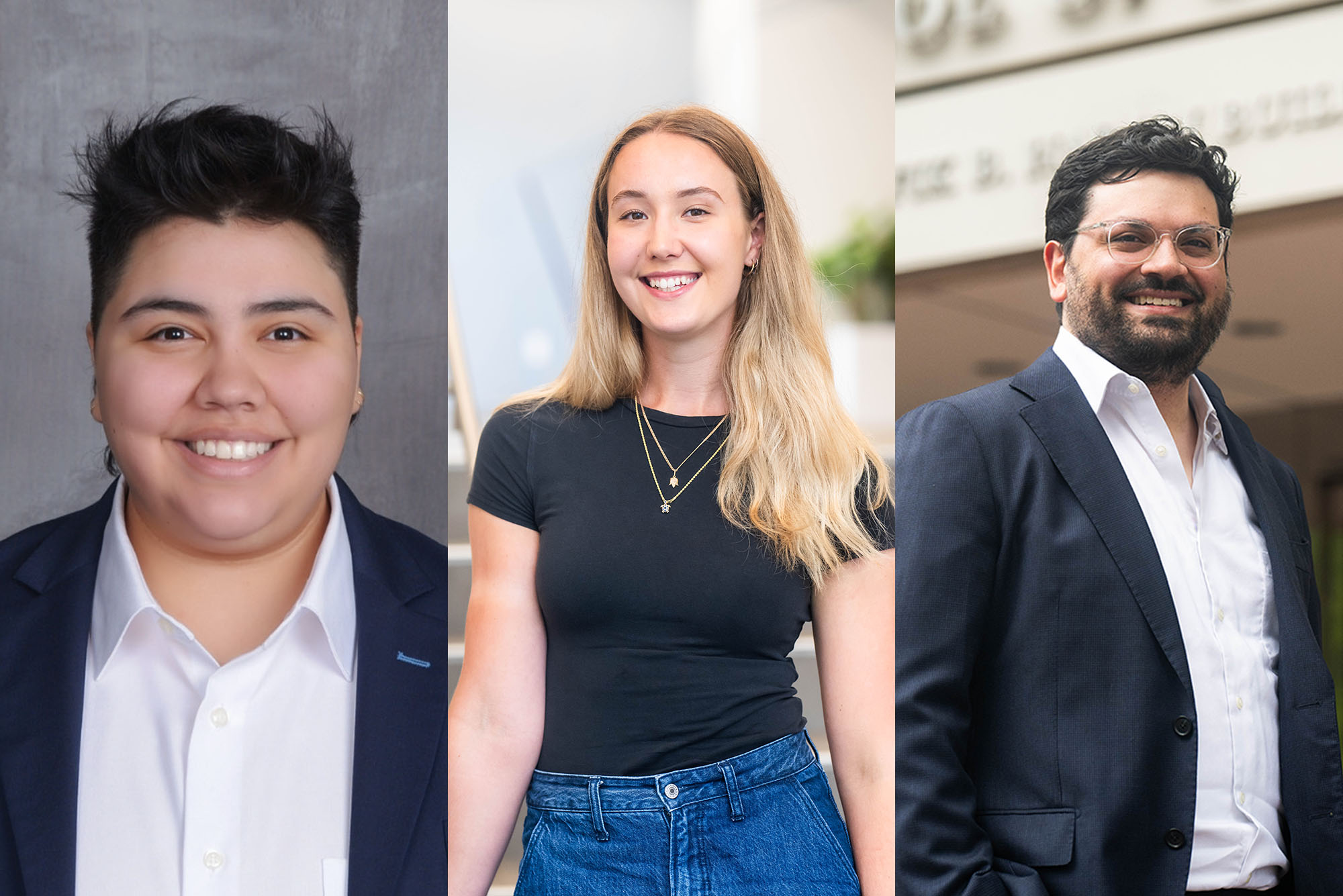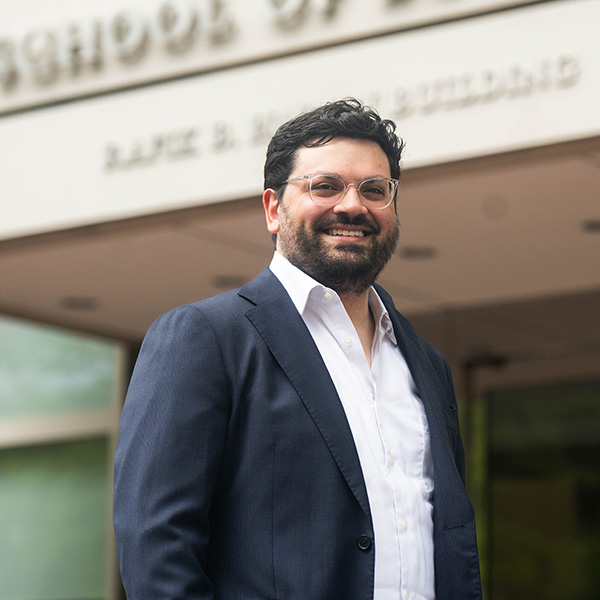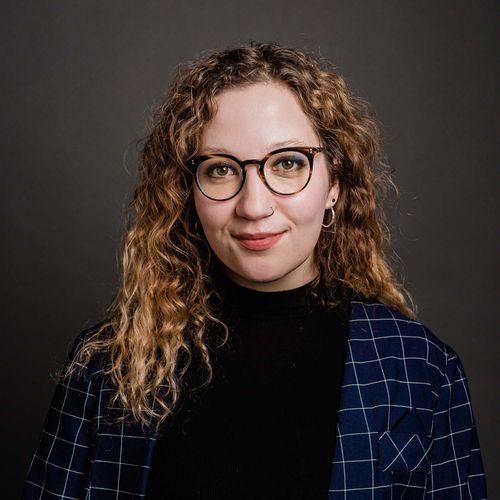Three Standout BU Graduating Master’s Students Share What Drives Them

Boston University master’s graduates Taylor Morales (COM’25) (from left), Katya Robbins (CAS’24, MET’25), and Evan Rizvi (Questrom’25). Photos courtesy of Morales, Robbins, and Rizvi.
Three Standout BU Graduating Master’s Students Share What Drives Them
Film, climate change, music are just some of the interests propelling these students into their next professional chapters
Before Boston University’s 2025 Commencement on Sunday, May 18, about 8,000 graduates will walk across various stages at their individual school and college ceremonies. Approximately 3,600 of those graduates are master’s, professional, and doctoral students.
For BU students pursuing advanced degrees, Commencement weekend is the culmination of their additional years of hard work and sacrifice. For some, Commencement represents a professional pivot or an exciting new direction in a field of study.
BU Today is highlighting three standout advanced-degree students ahead of Commencement. These hardworking Class of 2025 graduates hail from Metropolitan College, the College of Communication, and the Questrom School of Business.
Taylor Morales, College of Communication

For a former Boston College Eagle, Taylor Morales (COM’25) has had a surprisingly good run at Boston University. (Just joking…mostly.)
The California native and soon-to-be screenwriting MFA grad recently won COM’s Erin Victoria Edwards Award for Leadership in Diversity, Equity, and Inclusion. The award is named for former COM student Erin Edwards (COM’21), a passionate student leader and Posse scholar who died in a tragic incident before her junior year. Edwards Award winners are recognized for their commitment to DEI initiatives in their communities.
Beyond screenwriting, Morales is a talented videographer and content producer. (She runs her own production company, MoralesMultimedia.) She’s long used her skills to do pro bono social media and video work for service-oriented organizations.
“Not to promote BC,” Morales says, laughing, “but their motto is ‘Men and women for others’ and that’s something I’ve really taken to heart.”
For example: Morales filmed the 2024 US Amputee Soccer Cup, held at Franke Field in Cambridge, for the US Amputee Soccer Association. She’s also done work for the Stateless Collective, a BU alumni–founded nonprofit that offers online learning to displaced students.
Her schoolwork, too, has often dealt with inclusivity and representation. Back at BC, Morales made a documentary on the genocide of Indigenous peoples in British Columbia, Canada. That film gave her the experience that enabled her to moderate a 2024 COMtalk on Indigenous representation in the media.
The COVID-19 pandemic offered many a chance for reflection. With a freshman year interrupted by lockdowns, Morales says, “it really opened my eyes to the world outside of myself, and how I can use my privilege and access to education and information to help others.” That includes her pro bono work: “It might seem silly that I made a social media reel for someone for free,” Morales says. “Like, did I give them $10,000? No, but I gave them something I could give, and I think that matters.”
[The pandemic] really opened my eyes to the world outside of myself, and how I can use my privilege and access to education and information to help others.
Her interest in screenwriting came from a deep love of storytelling.
Morales studied English and film at BC. She took three screenwriting courses there and “really, really loved it,” she says. When she decided to pursue a master’s degree, she headed down Commonwealth Avenue to BU.
The COM screenwriting MFA program is unique. Students spend the first three semesters in Boston, studying and eventually leading an undergraduate discussion section, thus gaining teaching experience. They spend their final semester in Los Angeles—with BU’s LA Program—taking night classes and working in an industry internship by day.
As a screenwriter, Morales likes to write a little bit of everything. Period dramas, horror, mystery—there’s no single genre she sticks to. What she always comes back to, though, are deeply human characters, often with intersectional identities. (Her own identity as a queer and Hispanic woman influences her interest in intersectionality, she says.)
She’s been revamping a film script she wrote about a young Mexican-American man in a seminary in New York. The film is set the year before the AIDS epidemic took off. Her protagonist is a gay man secretly involved in the city’s underground drag scene, who ends up unknowingly contracting HIV. He gets kicked out of seminary after backstabbing friends reveal his involvement in the drag world. The script follows the last year of his life, before he succumbs to the disease. “I’m very interested in people whose stories are overlooked,” Morales says.
Morales spent the last semester interning with Atlas Entertainment, a production company responsible for blockbusters like Oppenheimer and American Hustle. After graduation, she’s set to work as a features development intern at another blockbuster production company, Skydance Media, whose films include Top Gun: Maverick and Annihilation.
Ultimately Morales sees herself going into film. If not screenwriting, in a production role: “I would love to be a prolific female producer, or just someone who champions films that are high-entertainment while representing diverse communities,” she says. She points to noted filmmaker Ryan Coogler, director of Sinners and Black Panther, as one example of someone who delivers great stories that also champion marginalized actors and crew members.
She plans to learn as much as she can at the internship, she says—she’s looking forward to working directly under a Skydance producer—and potentially take it to her own production company or media venture someday.
There are so many roads to take in the industry, Morales says. No matter what she does, it will always be about the human-centric, representative stories she loves: “All I know is that I want to be the one to touch these stories and help get them developed.”
Katya Robbins, Metropolitan College

Aerobically, rowing is one of the hardest sports out there. That’s precisely what Katya Robbins (CAS’24, MET’25) loves about it.
“It’s honestly such a privilege to push your body to the max in that way,” says Robbins, cocaptain of the BU women’s rowing team and an upcoming master in urban affairs grad. “You get so addicted to it.”
A native of Bracknell, England, Robbins came to the United States on a college rowing scholarship. She started at the University of Iowa before transferring to BU her junior year. In the past few years, BU women’s rowing has been on a mission: becoming a national powerhouse, winning the Patriot League Rowing Championship in 2022 and 2024.
Robbins is too humble to say she’s had a part in the team’s success. (She will admit to medaling in women’s club fours at the Head of the Charles Regatta last semester.) But her teammates didn’t elect her captain twice without good reason, especially after she had to take her last undergraduate year off for an injury.
She needed hip surgery and also had complications from herniated discs. That was “really bittersweet,” Robbins says. While the longtime rower—she started at age 12—couldn’t compete, she was at least able to “redshirt,” a designation given to college athletes who sit out for a season, but can still train and participate in team activities without losing a year of their sports eligibility. (She also received an extra year of eligibility because of COVID-19. She completed her undergraduate degree in five years and completed her rowing eligibility during her graduate year.)
Robbins was captain during her fourth year of rowing. Being elected again, especially with new team members she hadn’t rowed with before, was “awesome,” she says.
“I’ve really enjoyed bringing the best out of the team,” she says. “It’s really cool to know that I’m respected, and that I have a legacy as someone who can push the team forward.”
Rowing isn’t Robbins’ only passion.
She graduated from the College of Arts & Sciences with a degree in biology and a minor in Earth and environmental sciences. When it came time for graduate school, she knew she wanted to do something more on the climate change side of things. She applied for Metropolitan College’s Master of Science in Urban Affairs (MSUA) program and got in.
The one-year MSUA combines elements of city planning and urban policymaking. Urban affairs students gain an in-depth understanding of the issues that towns and cities face—traffic, climate resilience, housing shortages—and learn about different kinds of solutions. Graduates are prepared for careers in urban policy, town management and development, nonprofit administration, and more.
The master’s program was an ideal fit for Robbins. “I’ve sort of taken my science background and transformed it into a more hands-on, problem-solving application,” she says. She was getting more and more interested in sustainability—so much so that she also signed up for MET’s Applied Sustainability Graduate Certificate, which she did concurrently with her master’s. Between the two programs, she quickly identified a point of interest: how to make cities more sustainable amid climate change and how to get more youth invested in those efforts.
If we don’t seriously think about climate change, we’re going to be in big trouble.
“If we don’t seriously think about climate change, we’re going to be in big trouble,” Robbins says. But there’s more to sustainability than just staving off global warming: for example, she continues, “I’ve looked into how green spaces [in a city] can reduce crime rates. There’s a psychological health aspect to it as well.”
Of course, real change requires buy-in from policymakers and corporations. (Persuading big energy companies to modify their operations is a whole other challenge, she says.) But getting aspects of sustainability—what sustainable practices look like, what kinds of careers you can go into—onto young people’s radar is a key way to build a generation of motivated citizens.
“You always hear, ‘Turn off the lights [when you leave a room]’ or ‘Turn the water off when you’re brushing your teeth,’” Robbins says. “But you don’t necessarily learn about where your waste goes, or where your energy comes from, or how to preserve the green spaces around you. I would love to see more STEM programs that introduce some of these concepts [at an earlier age].”
At MET, her coursework involved a MetroBridge project with the Fort Point Neighborhood Association. (MetroBridge is a unique program that pairs classes with a real-world stakeholder that students perform city-related research for.) She and her Urban Research Methods classmates were charged with providing input to the association on what to do with the former site of P&G Gillette’s South Boston factory, which sits on a 31-acre water-adjacent plot. Robbins was on the team covering open and civic spaces. Their key recommendations: beef up the green spaces along the Boston Harborwalk and create or identify a place where neighborhood residents can vote.
“I’d never gotten to work on a real-world project like that before,” says Robbins, whose team spent the semester performing site visits, analyzing geographical data, and surveying residents to create their recommendations. “It was such a cool opportunity.”
For her, the MetroBridge project—and her recent MET Award for Excellence in Graduate Study—have solidified that she’s on the right professional track. She’s planning to go back to England after graduation, where she’ll look for jobs related to urban sustainability. She also plans to stay involved in rowing.
It’s been a whirlwind year, Robbins says. And a rewarding one.
As she wrote to MET’s awards committee, entering the Urban Affairs program was intimidating at first. She came directly from undergrad and wasn’t sure if she had the planning or policy skills needed to succeed. “I quickly learned that what matters most is your willingness to learn, ask questions, and stay open to new ideas,” she wrote. “Don’t be afraid to start from where you are. Lean into your strengths, embrace the challenge, and trust that you’ll grow more than you expect.”
Evan Rizvi, Questrom School of Business

Evan Rizvi (Questrom’25) knows he is not the traditional MBA candidate: prior to Questrom, he was a professional opera singer.
Rizvi is currently co–executive director of Music for Food, a nonprofit that raises money for food pantries through live performances by world-renowned classical musicians. The organization was founded by New England Conservatory of Music (NEC) faculty member Kim Kashkashian, an accomplished violinist. Music for Food has 22 chapters across the United States, Canada, and Taiwan, and has raised the equivalent of 3 million meals.
Being codirector has been so rewarding, says Rizvi, who took on the role alongside a close friend in 2024. It also never would have happened without Questrom.
Rizvi graduated from NEC in 2015 with a degree in vocal performance. He spent the next eight years singing in performances from Don Giovanni to Gianni Schicchi. Sometime in 2020, after COVID-19 shut down the world and in-person performances with it, wheels started turning in his mind.
“A lot of these high-performing arts organizations—symphonies, opera companies—didn’t have a clear-cut way to handle adverse events [like a public-health emergency] in the same way that the corporate sector did,” he says. In his observation, the decision-makers—often brilliant artists, not number-crunchers—lacked the analytical tools needed to make strategic calls. “That made me think: hmmm, I have a background in the arts; it would be really cool to acquire some of the skills needed to address these issues.”
By 2023, Rizvi had enrolled in Questrom’s Social Impact Master’s of Business Administration program. The two-year program teaches students how to use their business skills to serve society, whether through nonprofit management or private sector work that affects positive change. His goal? Learn how to make arts management, and the arts in general, more resilient to change.
The learning curve was steep, he says. The program immediately immerses MBA candidates in all things business: finance, accounting, marketing, HR management. “There were so many times in that first semester where I was like, ‘I’ve made a mistake; I can’t do math, I’m an opera singer!’” he recalls, laughing.
But Questrom’s approach worked. Rizvi realized his brain was still storing concepts (even accounting ones). He also realized the “soft skills” from his arts background, like collaboration and emotional intelligence, were a huge asset for teamwork and leadership. By the time he got to his electives—such as nonprofit management—he was ready to test his skills in a real-world setting.
Music for Food came along at the perfect time.
At the end of his first year, one of his professors put him in touch with Kashkashian, who is a friend of hers. Kashkashian was looking for an executive director who could handle the strategy and financial aspects of the nonprofit. Rizvi knew he could do it—especially the numbers. “Business math is actually what I’ve come to enjoy the most at BU, which I never would have thought before,” he says.
He’s spent the past year handling budgets, financial statements, and donation processing for the nonprofit. His codirector, his former roommate at NEC, handles marketing and concert operations. Rizvi’s work with Music for Food is part of what led him to be recognized as a 2025 Best & Brightest MBA by the business-education publication Poets and Quants.
One hundred percent of Music for Food’s proceeds go to food pantries.
“One hundred percent of Music for Food’s proceeds go to food pantries,” Rizvi says. Also gratifying? Getting to use his MBA skills to steward an organization that “was very much built by musicians, for musicians.”
He’ll continue in that vein after graduation.
Rizvi has a job lined up at NEC, where he did his summer internship: he’ll be the associate director of strategic initiatives. The role will require him to work closely with the college’s chief financial officer and trustees to make budgetary decisions, such as running profit and loss predictions for new NEC courses.
Being able to deliver on his MBA goal is a huge win, Rizvi says.
“We all have to go to school, get jobs, and work. But what’s the point if we don’t have museums, or books, or Netflix shows, or live music to enjoy?” he says. “There’s this conundrum where everybody consumes art, but doesn’t necessarily think the artists who created that art should be compensated.”
A world without art would be “flat and boring,” he adds. “The analogy I like to use is: trees and bushes. Think about how depressing a city would be if there were no parks or trees or bushes anywhere. We take those things for granted—can you imagine Comm Ave without the magnolias that line the street? To me, that’s what the arts are.”

Comments & Discussion
Boston University moderates comments to facilitate an informed, substantive, civil conversation. Abusive, profane, self-promotional, misleading, incoherent or off-topic comments will be rejected. Moderators are staffed during regular business hours (EST) and can only accept comments written in English. Statistics or facts must include a citation or a link to the citation.